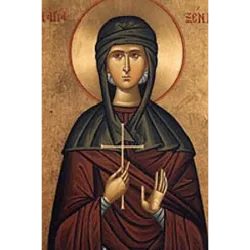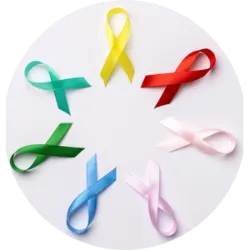January 24 is the feast day of Saint Xenia

January 24 is the feast day of Saint Xenia, in honor of the Russian saint, especially venerated by the Orthodox Church. Saint Xenia of Petersburg is remembered for her life of great faith, devotion and humility. She was born into a noble family, but after the death of her husband, she made a radical choice: she dedicated herself to religious life, renouncing material goods and living as a poor woman and pilgrim, in search of spiritual salvation.
Saint Xenia is known for her deep connection with God and her life of prayer. After the death of her husband, she dressed in simple clothes and began to walk the streets of St. Petersburg, helping those in need and devoting herself to meditation. Her life of service and self-denial generated many reports of miracles attributed to her intercession, and she quickly became a symbol of devotion and faith among Orthodox Christians.
January 24 is marked by liturgical celebrations, with masses and prayers, especially in Orthodox churches, where the legacy of Saint Xenia is remembered. For the faithful, the date is an opportunity to reflect on the values of humility, charity and love of neighbor, which marked the life of the saint.
Saint Dominic de Gusmão 's Day is celebrated on August 8

Saint Dominic de Gusmão 's Day is celebrated on August 8 . Saint Dominic was a 12th century Spanish priest and is known for being the founder of the Order of Preachers, better known as the Dominican Order. He is revered as a saint by the Catholic Church and is remembered for his life dedicated to serving God and teaching the Christian faith. Domingos dedicated his life to preaching the Gospel and fighting against heresies of the time. He traveled extensively throughout Europe, preaching and teaching, and founded the Order of Preachers to promote religious education and combat religious ignorance.
Test yourself with one of these challenges 👇
Discover some interesting facts about Commemorative Dates
February 18 is Wine

February 18 is Wine Day, a date that highlights the cultural, economic and historical importance of this ancient drink. In Brazil, viticulture has deep roots, dating back to 1532, when Brás Cubas, founder of Vila de Santos, brought grape vines from Portugal and cultivated them on the slopes of Serra do Mar, in one of the first attempts at wine production in the country.
Despite the challenges, grape cultivation prospered over the centuries, with the first notable vineyards appearing in the Tatuapé region of São Paulo. In the 20th century, descendants of Italian immigrants modernized production, professionalizing the sector and consolidating wineries with a high technical level. Brazil currently has six main wine regions, such as Serra Gaúcha, Planalto Catarinense and Vale do São Francisco, as well as recognized designations of origin, such as Vale dos Vinhedos and Pinto Bandeira.
Wine, with over 8,000 years of history, is celebrated worldwide not only for its flavor, but for its impact on global culture and economy. In addition to World Wine Day, there are dates such as Día del Malbec (April 17) and International Wine Day (May 25). Whether it's a full-bodied red, a refreshing white or a festive sparkling wine, the date is an opportunity to enjoy and explore new flavors. Cheers to this tradition!
celebrate in February 18
January 5th, the feast day of Saint Simeon the Stylist

January 5th, the feast day of Saint Simeon the Stylist, is a religious day dedicated to one of the great saints of the Orthodox Church. Simeon, known as "the Stylist", was a 6th-century Christian monk who dedicated his life to monasticism and the pursuit of spiritual purity, living an austere life in a cave in the Syrian desert.
Saint Simeon the Stylist was born at a time of great religious fervor and reform within the Eastern Church. He is remembered for his life of penance and continual prayer, choosing to live in seclusion in order to seek a deeper union with God. The word "Stylist" comes from the Greek term "stylos", meaning "pillar", symbolizing the way in which Simeon became a pillar of faith for many Christians of the time.
Saint Simeon is often associated with the practice of the ascetic lifestyle, which involves renouncing material comforts in favor of a life of prayer, fasting and meditation. He was also known for his ability to heal and help those who sought spiritual guidance.
The Orthodox Church celebrates this day to honor Simeon's example of faith and dedication, inspiring the faithful to live with greater devotion and humility.
celebrate in January 5
January 23 is Integrative Medicine

January 23 is Integrative Medicine Day, a date that highlights the importance of healthcare that combines conventional medical practices with complementary therapies based on scientific evidence.
Integrative medicine focuses on treating the patient holistically, considering not only the physical aspects, but also the emotional, social and spiritual ones. Therapies such as acupuncture, meditation, yoga, herbal medicine and relaxation techniques are often incorporated into traditional medical treatment to promote well-being and quality of life.
The date was established to raise awareness about the benefits of this integrated approach, which seeks not only to treat diseases, but also to prevent health problems, promoting balance of body and mind. Healthcare institutions, organizations and professionals around the world hold events, lectures and workshops to promote integrative practices and educate the public about their effectiveness.
celebrate in January 23
November 27th is Cancer Awareness

November 27th is Cancer Awareness Day. The date was established by Law No. 11,652, of April 7, 2008, with the aim of raising awareness about cancer prevention and control in Brazil. The choice of November 27th refers to the founding of the National Cancer Institute (INCA), created in 1937, which plays a crucial role in the research and treatment of the disease. The day serves to promote information campaigns about the importance of early detection, appropriate treatment and palliative care, in addition to highlighting the need for support for patients and their families. Cancer is one of the main causes of death in the country, and the date seeks to mobilize society and health agencies to implement preventive actions, offering resources and support to those facing this disease.
celebrate in November 27
Saint Bruno 's Day is celebrated annually on October 6.

Saint Bruno 's Day is celebrated annually on October 6. Saint Bruno was a monk and the founder of the Carthusian order, one of the most rigorous religious orders in the Catholic Church. Born in Germany, he was noted for his life of prayer, solitude, and contemplation. Saint Bruno and his followers pursued an austere lifestyle dedicated to meditation and spiritual pursuits. The Carthusian order, which he founded, is known for its seclusion and emphasis on silent prayer. Devotion to Saint Bruno is especially strong in places where Carthusian monasteries exist.
celebrate in October 6
Test yourself with one of these challenges 👇
HOME










